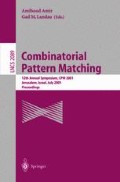Abstract
Given k permutations of n elements, a k-tuple of intervals of these permutations consisting of the same set of elements is called a common interval. We present an algorithm that finds in a family of k permutations of n elements all K common intervals in optimal O(nk+K) time and O(n) additional space.
This extends a result by Uno and Yagiura (Algorithmica 26, 290-309, 2000) who present an algorithm to find all K common intervals of k = 2 permutations in optimal O(n+K) time and O(n) space. To achieve our result, we introduce the set of irreducible intervals, a generating subset of the set of all common intervals of k permutations.
Access this chapter
Tax calculation will be finalised at checkout
Purchases are for personal use only
Preview
Unable to display preview. Download preview PDF.
References
K.S. Booth and G.S. Lueker. Testing for the consecutive ones property, interval graphs and graph planarity using PQ-tree algorithms. J. Comput. Syst. Sci., 13(3):335–379, 1976.
R.M. Brady. Optimization strategies gleaned from biological evolution. Nature, 317:804–806, 1985.
D. Fulkerson and O. Gross. Incidence matrices with the consecutive 1s property. Bull. Am. Math. Soc., 70:681–684, 1964.
M.C. Golumbic. Algorithmic Graph Theory and Perfect Graphs. Academic Press, New York, 1980.
S. Kobayashi, I. Ono, and M. Yamamura. An efficient genetic algorithm for job shop scheduling problems. In Proc. of the 6th International Conference on Genetic Algorithms, pages 506–511. Morgan Kaufmann, 1995.
E.M. Marcotte, M. Pellegrini, H.L. Ng, D.W. Rice, T.O. Yeates, and D. Eisenberg. Detecting protein function and protein-protein interactions from genome sequences. Science, 285:751–753, 1999.
H. Mühlenbein, M. Gorges-Schleuter, and O. Krämer. Evolution algorithms in combinatorial optimization. Parallel Comput., 7:65–85, 1988.
R. Overbeek, M. Fonstein, M. D’Souza, G.D. Pusch, and N. Maltsev. The use of gene clusters to infer functional coupling. Proc. Natl. Acad. Sci. USA, 96(6):2896–2901, 1999.
B. Snel, G. Lehmann, P. Bork, and M.A. Huynen. STRING: A web-server to retrieve and display the repeatedly occurring neigbourhood of a gene. Nucleic Acids Res., 28(18):3443–3444, 2000.
T. Uno and M. Yagiura. Fast algorithms to enumerate all common intervals of two permutations. Algorithmica, 26(2):290–309, 2000.
Author information
Authors and Affiliations
Editor information
Editors and Affiliations
Rights and permissions
Copyright information
© 2001 Springer-Verlag Berlin Heidelberg
About this paper
Cite this paper
Heber, S., Stoye, J. (2001). Finding All Common Intervals of k Permutations. In: Amir, A. (eds) Combinatorial Pattern Matching. CPM 2001. Lecture Notes in Computer Science, vol 2089. Springer, Berlin, Heidelberg. https://doi.org/10.1007/3-540-48194-X_19
Download citation
DOI: https://doi.org/10.1007/3-540-48194-X_19
Published:
Publisher Name: Springer, Berlin, Heidelberg
Print ISBN: 978-3-540-42271-6
Online ISBN: 978-3-540-48194-2
eBook Packages: Springer Book Archive

